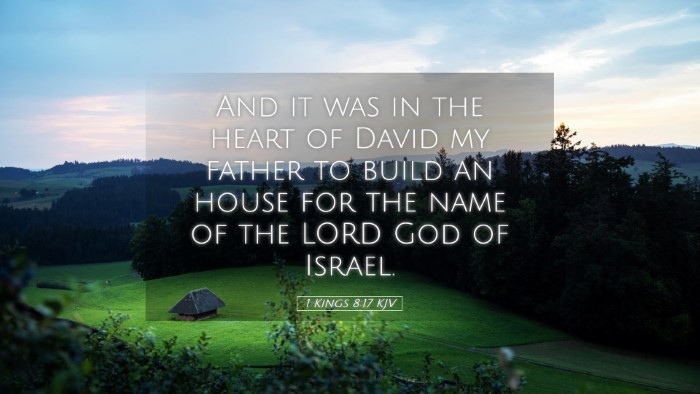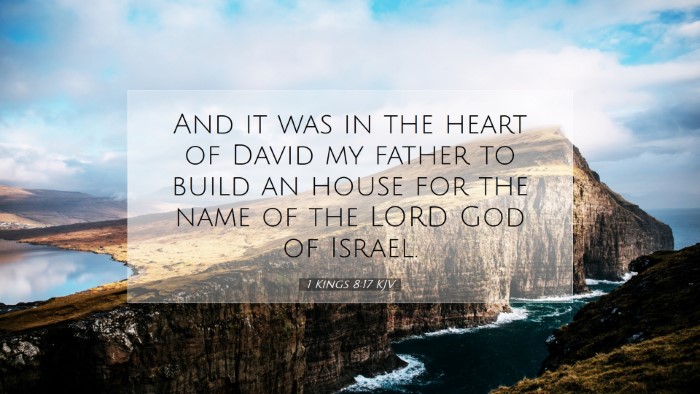Commentary on 1 Kings 8:17
1 Kings 8:17 states: "And it was in the heart of David my father to build an house for the name of the Lord God of Israel."
Contextual Overview
The passage forms part of Solomon's dedicatory prayer at the inauguration of the temple. It highlights King David's deep desire to construct a dwelling for the Lord, which reflects his devotion and understanding of God's significance in his reign and in the life of Israel.
Theological Insights
David’s intention to build a temple demonstrates
- The Priority of Worship: David recognized the importance of a centralized location for worship, establishing that God’s presence should be honored with a dedicated space.
- A Legacy of Faith: This desire illustrates David's heart for God, which would pass to his son Solomon, thus ensuring spiritual continuity for the nation of Israel.
- God's Sovereignty: Despite David's noble intentions, the decision was ultimately deferred to Solomon, reminding readers that the divine will often transcends human plans.
Exegesis According to Matthew Henry
Matthew Henry comments on this verse, noting that the passion to build a temple reflects an understanding of God’s majesty and the need for a holy and dedicated space. David’s heart was right before God, and he sought to honor the divine presence by creating a sacred abode. Henry further explains that the temple signifies the desire for communion with God and also symbolizes the covenant relationship between God and Israel.
Albert Barnes’ Perspective
Albert Barnes highlights the significance of David's intention not just as an architectural project but as a profound expression of faith. He points out that while God allowed David to prepare for the temple's construction, He appointed Solomon to build it. This distinction emphasizes the need for divine approval in all spiritual endeavors. Barnes notes that God’s approval of Solomon as the builder conveys an important theological truth: the pursuit of holiness must align with God’s will.
Insights from Adam Clarke
Adam Clarke elaborates on the context surrounding David’s desire to build the temple. He remarks on the implications of a structure that represents God’s presence among His people, arguing that it would serve as a powerful visual reminder of God’s faithfulness and glory. Clarke also discusses the symbolic nature of the temple as a foreshadowing of Christ—a central place of worship that would ultimately be fulfilled in Jesus, the true temple.
Applications for Today
The insights from this verse and the commentaries provide rich applications for modern readers:
- Prioritizing Worship: As church leaders and individual believers, there should be a rooted priority for corporate and personal worship, acknowledging God’s presence in designated places of worship.
- Legacy Building: Leaders like David inspire current leaders to think about the legacy they leave not just materially but spiritually for future generations.
- Alignment with Divine Will: Those exploring ministry should remember the importance of seeking divine guidance to align their plans with God’s purposes.
- Acknowledge God’s Glory: Just as the temple was meant to glorify God, modern-day worship settings should strive to manifest His glory in all they undertake.
Conclusion
1 Kings 8:17 encapsulates the essence of a passionate desire to honor God through dedicated worship. Both David and Solomon’s initiatives reveal essential truths about worship, legacy, and divine purpose. By examining these insights, modern faith communities can draw wisdom that fuels a deeper commitment to glorifying God, fostering genuine worship experiences, and building a lasting spiritual legacy.


